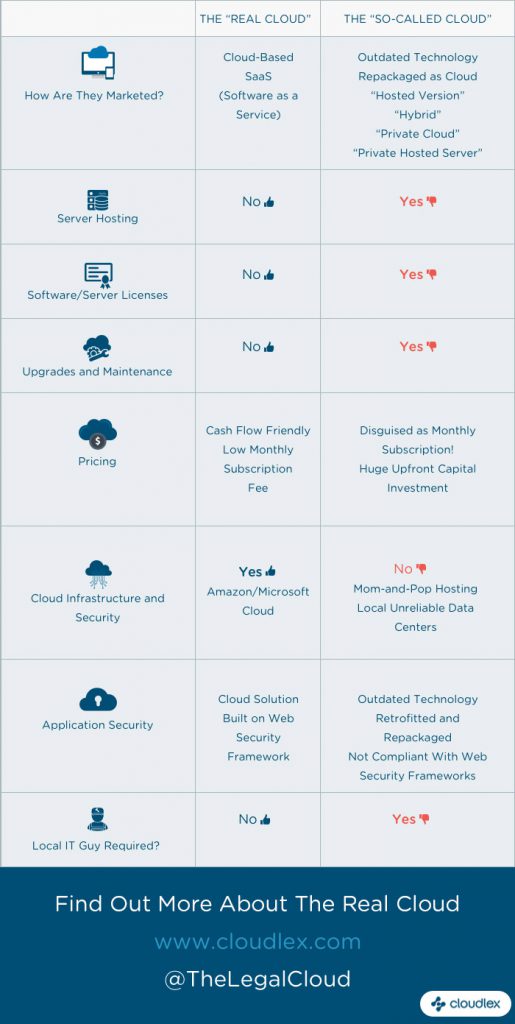More and more personal injury law firms are moving to the cloud for their case and matter management software requirements. Cloud-based law firms tend to be more responsive, nimble and cash flow healthy. All of which makes them very competitive in today’s environment of ever-changing technology and new-age plaintiffs that are always online. Your decision to move to the cloud will determine your firm’s success. The million-dollar question is, are you on the “Real Legal Cloud Based Software”? To get the full answer, we advise you to ask the following questions as you make this crucial decision:
Contents
1. Is this Just “lipstick on a pig”?
Just because a solution is “hosted by your vendor” doesn’t make it a true cloud-based software solution. Nor does paying a monthly fee to your vendor make it a true “SaaS” (Software As A Service) solution.
Real Legal Cloud solutions are built on the latest, most-sophisticated web technologies, from the ground-up. Meaning, the application is conceived, conceptualized, designed, and developed as a cloud application, right from the start. The “cloud” cannot be retrofitted to legacy hosted solutions developed decades ago. Simply put, a real legal cloud solution is designed in a way that gives you the reliability, security, scalability, availability, and usability that outdated practice management solutions can never provide.
The next time someone pitches you a personal injury cloud-based case management system, ask them these questions:
- To test their application’s security, ask them if they can ensure HIPAA compliant application and data security?
- When was the last time they conducted proactive vulnerability tests for their application?
- To test the scalability of their solution, ask if they can set up 5000 users as seamlessly as they can set up 5 users? If it is a repackaged legacy product, the answer will be “no” or “it will take additional time”.
- To determine the real cost of their system and root out any hidden fees, ask them if you will need to add additional servers, databases, and software licenses, or if you will incur additional maintenance costs as you grow? If it is a repackaged outdated solution, you will incur additional costs (beyond the standard per-user fees) as you grow.
- Ask if they can ensure 99.99% uptime?
2. “Venue” matters! Wouldn’t you agree?
As a personal injury attorney, you realize the importance of the venue. Well, in the case of cloud solutions the “cloud hosting venue” is a very important factor.
There are 5 major Cloud Infrastructure Providers:
- Amazon (Amazon Web Services)
- Microsoft (Microsoft Azure)
- IBM
- Salesforce.com
These providers have invested billions in creating a state of the art server farms across the globe. A typical data center for these providers runs hundreds of thousands of servers, is as large as ten football fields, and uses as much electricity as a small town. These providers have compiled a huge array of cloud hosting services and platforms that are supported by their immense resources.
Ask your solution provider:
- Where do they host? A “mom-and-pop” or “regional data center”, with only one or two locations, should concern you.
- Do they have “geo-redundancy”? Meaning if one data center goes down, then other centers located in different locations automatically kick in.
- How do they back up your data?
- How do they manage ongoing maintenance, monitoring, and upgrades?
Security is one of the biggest concerns when moving to the cloud-based law practice management software. Mature cloud providers like Microsoft/Amazon have designed their platforms with robust security features that have become the industry standard. Their data centers across the globe undergo continuous monitoring, regular security check-ups, and frequent updates. They recruit and employ only the best and brightest engineers and cybersecurity professionals. Regional data centers may not be able to adhere to such stringent levels of security, nor do they have access to the same level of professional resources, leaving your firm and client data open to hacks and putting your business at risk.
Mature cloud service providers have a global reach with a vast selection of recovery options. Leading cloud services like Microsoft Azure back up six copies of your information in at least two geographically dispersed data centers, which assures 99.9% availability of data and backups. Their ongoing monitoring program not only ensures high performance but also ensures the security of your data. Unlike small data centers, leading cloud service vendors like Microsoft Azure and Amazon Web Services employ a team of experts to monitor their data centers 24/7/365 to assure seamless cloud connectivity for all their clients, regardless of size. Simply put, small regional data centers simply don’t have the technical expertise, capital, resources, or skills to offer the security, reliability, and availability that your personal injury law firm needs.
3. Would you refer a “med mal” case to your “immigration attorney” colleague?
The answer, of course, is an emphatic “No”. Personal injury is a specialized practice area of law that requires unique skills, expertise, and experience. So is the field of technology development. Developing legal cloud solutions requires a team of expert technology professionals, including cybersecurity experts, software engineers, designers, architects, and systems experts.
If you really want a cutting-edge legal cloud software, then go to expert software engineers who truly know both the personal injury space and cloud technology, not to a lawyer who develops software while running his practice. In the real world, lawyers are not supposed to be software engineers (unless they hold a dual degree in computer science and have written millions of lines of code).
Ask your solution provider these questions to determine their expertise:
- What is the background of their founders and of their key legal experts and technology experts?
- How big is their software engineering team? How many architects, product managers, lead engineers, database engineers, front-end developers, back-end developers, cybersecurity professionals, etc.?
- Is their software development outsourced or do they have their own in-house team?
- How many years of experience do they have developing software technology, specifically cloud technology and legal industry technology?
- Do they have any Silicon Valley venture capital funding?
- Do they have any official associations with tech giants like Microsoft?
The bottom line is, you need to be a full-fledged software development firm, with sophisticated resources, software development skills, high-tech expertise, and experience to be a cloud-based solution provider. You need a reliable and robust organization that has teams of development engineers, testers, architects, designers, analysts, and support engineers who develop and maintain the product day in and day out. In addition, you need an organization that employs lawyers to bring subject matter expertise to every step of the design process. This is an area where association with technology giants like Microsoft, the involvement of sophisticated Silicon Valley venture capital firms and teams with advanced, sophisticated pedigrees really do matter!
In summary, as with any hot industry, there are technology innovators who set the trends and others who cling to their coattails. As you look for a personal injury case management software, you need to very carefully filter out the noise and evaluate whether the solution presented is the “Real Legal Cloud”.


